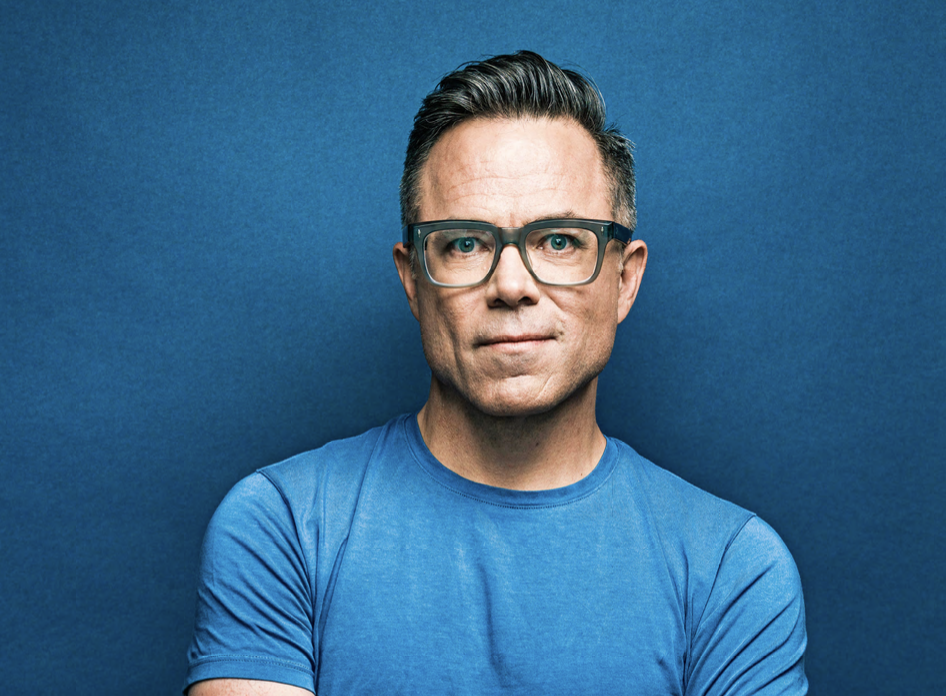By Peter Feniak
His commitment to facts has made him a champion in the fight against medical misinformation and pseudoscience; it has also made him a few enemies
The Great Debunker never did get to speak to Gwyneth Paltrow.
“I reached out to her; I did try repeatedly,” Timothy Caulfield says of his quest to interview the Oscar-winning actress who created the lucrative wellness brand Goop. “Her people would be tentative. Then they probably Googled me, and the reply was ‘It’s not right for Gwyneth right now.’”
Perhaps it was “not right” because Googling Caulfield would have revealed that he specializes in public-health and medical pseudoscience. In 2015, he published his book Is Gwyneth Paltrow Wrong About Everything? (Viking Press), a widely read, good-humoured takedown of celebrity-endorsed “health and lifestyle products.”
Launched to “nourish the inner aspect,” Goop products range from scented candles and health supplements to coffee enemas. Are they effective? Caulfield writes, “Getting straight answers about anti-aging and beauty products is nearly impossible.” The beauty and wellness industry, he concludes, “is one of the most significant and influential sources of pseudoscientific baloney.” (A number of Goop health products remain controversial.)
Is Gwyneth Paltrow Wrong About Everything? is an entertaining “buyer beware” that also introduces a broader theme: the growing influence of celebrities and celebrity culture on “our ambitions and what is supposed to make us happy.” Celebrity influence, Caulfield maintains, results in “poor health decisions [and] increased dissatisfaction with our appearance, and, perhaps, our lives.” He cites a survey that revealed that “kids who used to want to be a doctor, a lawyer, a policeman, now want overwhelmingly just to ‘be famous.’”
Thought-provoking and entertaining, Caulfield has become an in-demand speaker and pop-culture commentator. He is also completely serious in his purpose. It springs from his day job as a professor in the University of Alberta Faculty of Law. He is research director of the university’s Health Law Institute and a fellow of the Royal Society of Canada. He and his colleagues review the ethics of medical research (are claims well supported?), they study public-health challenges from emerging technology (think stem cells and genetics), and they flag the growing volume of misleading information about health and science. Given the ceaseless flow of claims and commentary on the Internet, Caulfield warns that “forces that twist science” now go beyond commercial advertising to “individuals who distort science to satisfy a particular agenda—to push a particular view on something like vaccines. We know that does incredible harm.”
Caulfield’s emergence as a popular figure was, he says, “a slow move into doing more stuff in the public sphere.” As misinformation grew, the esteemed author of more than 300 academic articles “went public.”
Relax!
A proud Albertan, Timothy Caulfield didn’t settle in Edmonton until his high-school years. He was born in 1963 in Cape Cod, Mass., where his father, D.D. Caulfield, studied the use of sonar to map ocean floors at the world-renowned Woods Hole Oceanographic Institution. The family (Ruth and D.D. had four sons) moved to Connecticut, to other US cities, and then to Ireland, the ancestral home of the Caulfields. When his father joined the efforts to map the floor of the Arctic Ocean, Edmonton became home.
As a teenager, Tim Caulfield fell in love with Alberta’s “beautiful blue sky” and, eventually, with Joanne Otto, whom he met on the high-school track team. (“She was a real talent—a four-hundred-metre hurdler, top-nine in the world as junior before she got injured,” he says. “I always joke that I was fast enough to meet her.”) Now married with four children—two boys, two girls—they were both achievers at the University of Alberta. Joanne undertook medical studies, and Tim took a science degree and then a law degree. He finished with a Master of Laws degree at Dalhousie University in Halifax.
But young Caulfield had competing ambitions. “As a teenager,” he smiles, “I wanted to be a musician.” Captured by the energy of punk rock, he wrote songs and fronted one band and then another while continuing his studies. “I was a mediocre songwriter,” he admits, “but I really enjoy the process of writing now. It’s not unlike writing a song.” He credits the influence of his mother, “a great lover of books, history, and long conversations.”
In the end, he says, “it was just luck that a research job opened at the University of Alberta back in the early ’90s. Here I am. And it’s fantastic. My brother’s a professor at the U of A. [Sean Caulfield, Faculty of Fine Arts, is an internationally known printmaking artist.] My wife is a clinical professor at the U of A. The university and the province have been very, very good to me. I feel fortunate.”
In 2017, two years after the success of his book Paltrow, Caulfield became the host of the TV show A User’s Guide to Cheating Death. With humour, it looks at procedures, both ancient and modern, that promise a longer life. Viewers can enjoy the fearless professor as he tests an “ionic footbath” or rests in a coffin. The show uncovers useful ways to live a better, longer life while also debunking the flawed science of much of the anti-aging industry. Produced for Vision TV over two seasons, it’s been seen in 60 countries and can still be found on some streaming services.
Caulfield’s most recent book, Relax: A Guide to Everyday Health Decisions With More Facts and Less Worry (Penguin Random House, 2022), was first published in 2020 as Relax, Dammit! A User’s Guide to the Age of Anxiety. In it, he uses science to probe the daily worries that trouble us. Searching, as ever, for “the real evidence,” the author answers a full day’s worth of everyday questions such as “How much sleep is enough?” and “Is it risky to use public toilets?” He debunks myths that make us anxious and reassures us with good science. No, he says, early rising does not increase productivity. And there’s no need to fear fluoride or tap water. (He calls these “modern medical miracles.”) As for the often-cited five-second rule on food dropped and then retrieved from the floor, he insists there is no rule and that the danger is minimal. Despite the anxiety caused by long-held fears and the ongoing, undisciplined flow of “excitable” information, Caulfield writes, “the world is safer than ever.” At the book’s conclusion, he exhorts readers: “Relax! And turn off your damn phone.”
Hate Mail, Death Threats, and Lies
When, in early 2020, the world suddenly faced COVID-19, science became a battleground. The declaration by the World Health Organization that the dangerous and fast-spreading virus was now a global pandemic came on March 11. As countries scrambled to control the virus, infection and death mounted, travel was restricted, protective masks became mandatory, and isolation kept families apart. False treatments were proposed. Approved treatments finally emerged, and vaccines against the disease became mandatory. Many bridled at the “new rules,” and there was endless questioning of governments and public-health authorities.
“Communications throughout the pandemic,” he says today, “has been a big part of the past three years of my life. I don’t mind telling you, it’s been exhausting.” As conventional news sources were challenged by contrary views from angry social-media posts, angst and confusion deepened. “The misinformation that spreads is emotional and negative, and it’s easy to process,” he says. “Take the ‘died suddenly’ movement suggesting that the vaccines are causing sudden deaths. That’s really about emotional anecdotes—about a young person or an athlete—versus hundreds of millions of data points filed by scientists and systematically evaluated. And to some the anecdote wins! It’s scary.”
Caulfield’s “stick to the evidence” views made him a target to those embracing radical misinformation. Even as 2023 unfolds, he says from Edmonton, “I deal with hate mail, death threats, harassment, lies being spread about me—saying I’m being paid by big pharma. My colleagues experience the same thing. For women and persons of colour, it’s worse.” Tempers rarely rise when Caulfield debunks beauty products, health supplements, and the “fame game,” but now, he sees real anger: “Misinformation-mongers, as I call them, create an erosion of trust in public institutions so it’s easier to spread their misinformation. It becomes a vicious circle.” Anxiety grows. “Now, rather than saying, for example, ‘here’s a study that supports ivermectin’ (an unauthorized, potentially dangerous, and now discredited COVID treatment), those who spread misinformation will say ‘We have 44 studies that support it’ just to create the illusion that there’s a body of evidence, when in fact that evidence doesn’t exist!”
Of the personal attacks, he says, “I have a pretty thick skin in general. ‘Just ignore it’ is, I think, the best strategy. But it does weigh on you. And sometimes you have to deal with it. I try to stay positive, try to keep my messaging constructive. I try to remind myself to ask ‘What’s going on in this person’s life that makes them this angry?’ I try to have a little bit of empathy, even when they’re striking out at me.”
To help keep his balance, the Great Debunker follows his own general advice—he exercises regularly. “And I’m very lucky, because I very much enjoy exercise,” he adds. “I realize that not everybody feels the same way. I love it. It’s how I decompress. My wife enjoys it, too. It’s often something we do together. And—thank you, pandemic—I now walk a lot, which I never used to do.” His close family has been a comfort. “We have all these ‘sciency’ kids,” he smiles. “No surprise, right? All but one have left the nest.” Each is progressing well.
Caulfield was in California, far from his family, when his phone buzzed in late December 2022. As he told CTV Edmonton, “I was sitting in a crappy coffee shop in a strip mall after an evening where people were yelling at me about misinformation, kind of at the end of my rope.” The call was from the office of the Governor General. “For his contributions to health law, policy, and ethics, and his work in fighting misinformation,” Caulfield would be appointed to the Order of Canada. “I got a little emotional,” he admits.
What’s next for the debunker? “I have a couple of creative projects on the go,” he says, “and I’m finishing another book. It’s about those guideposts that we look to to shepherd us through the noise and the social forces that are eroding those guideposts.” Does he think he can really help us find a better path through these chaotic times? You can hear his smile as he concludes our talk with “Stay tuned!”






